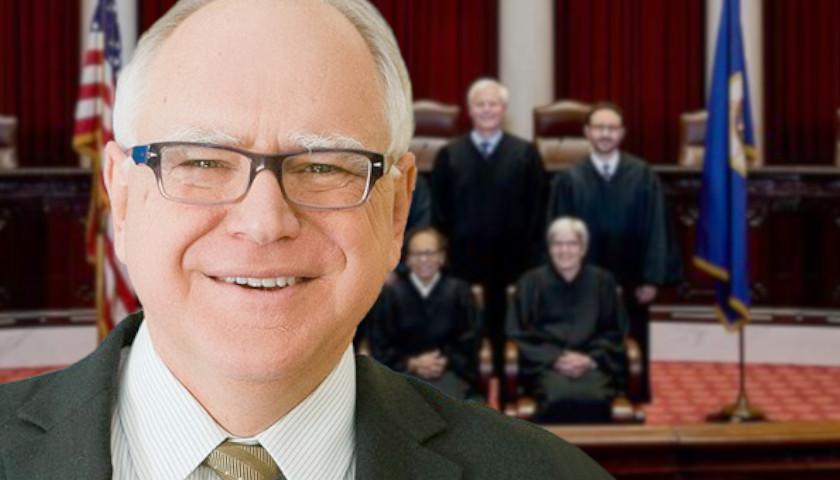by Hank Long
Justice G. Barry Anderson, the lone remaining Republican appointee on the Minnesota Supreme Court, announced his retirement last week after serving nearly 20 years as one of the state’s top judges.
Anderson notified Gov. Tim Walz on Thursday of his decision to step down from the court on May 10. Anderson turns 70 in October, the age of mandatory retirement that’s required by Minnesota statute.
“I have the greatest admiration for my colleagues on the Minnesota Supreme Court; the deliberative work of the court in making difficult decisions is both rewarding and challenging,” Anderson wrote in a letter to Walz. “We do not always agree, but I will leave the court as I found it, a judicial body composed of superb public servants dedicated to a collaborative process, seeking, within human limitations, to discharge our constitutional duties as best as circumstances allow.”
Anderson is considered a “mild Republican” by a Ballotpedia study on partisanship among state supreme court justices. He’s well known in Minnesota Capitol circles for his long-running non-partisan “Your Legislators” television program.
Gov. Tim Walz said in a statement on Thursday he will announce “in the coming weeks” the application process for his pick to appoint a replacement for Anderson, whose term expires at the end of this year.
“Justice Anderson has worked tirelessly to uphold the integrity and fairness of our justice system,” Walz said. “He is leaving the court stronger because of his commitment to the rule of law and the institution itself. As one of Minnesota’s longest serving justices, his legacy and work on the Supreme Court will endure for generations to come.”
Anderson’s retirement announcement comes just more than three months after Walz appointed his former general counsel and deputy chief of staff, Karl Procaccini, to fill a vacancy created by the retirement of Chief Justice Lori Gildea.
Procaccini, a self-admitted progressive Democrat, was one of Walz’s chief legal architects of his emergency powers-triggered executive orders that restricted many facets of life for Minnesotans during 2020 and 2021. One of those restrictions was an indoor mask mandate Walz invoked for 10 months that was challenged in state court. Procaccini replaced Chief Justice Gildea, who announced her retirement last summer. He will face the voters this fall and has already launched a campaign website.
Both Anderson and Gildea were appointed by Republican Gov. Tim Pawlenty, in 2004 and 2006, respectively. The other five justices on the court have been appointed by either Walz, or his DFL predecessor, former Gov. Mark Dayton.
Justices serve six-year terms on the Supreme Court. If someone retires before their term ends, the governor chooses a replacement to serve out the remaining term before that appointee is up for election.
Anderson’s third term on the court is set to expire in January 2025. His May 10 retirement date is too close to the 2024 election window, so any replacement Walz selects would not face election until November 2025, according to state statute.
Anderson wrote Walz that his May 10 retirement date is tied to his desire to help preside over a number of attorney bar admission ceremonies before he ends his tenure on the court.
“Chief Justice Natalie Hudson has graciously asked me to deliver remarks on behalf of the court at those May 10 ceremonies, I have agreed to do so, and I cannot imagine a better or more appropriate way to mark the end of my service on the court.”
When Anderson steps down later this spring he will have spent nearly 20 years as an associate justice on the Supreme Court. Prior to that he served on the Minnesota Court of Appeals for six years as an appointee of former Republican Gov. Arne Carlson.
Before his appointment to the judicial branch, the southern Minnesota native and University of Minnesota Law School graduate was a general practice lawyer based in Fairmont and then Hutchinson. Anderson had been involved in Republican politics, but as a justice he was regarded as a fair-minded originalist when it came to interpreting the Constitution. This led Anderson to author many dissents to majority opinions authored by his DFL-appointed colleagues.
Will newest additions to court face election challengers?
State statute requires Minnesota Supreme Court justices face the voters every six years. Because Gildea retired with well more than a year left on her term, Procaccini is serving the remainder of her term, and will be on the November 2024 ballot. It’s not yet known if the former Walz administration staffer will face one or more challengers.
While serious challengers to incumbent members of the Minnesota Supreme Court aren’t a given, in 2014, attorney Michelle MacDonald came within 7 percent of the vote against sitting Justice David Lillehaug.
In other states, Supreme Court elections are heavily contested. In 2023, Janet Protasiewicz, a left-wing-backed candidate for the Wisconsin Supreme Court, raised more than $13 million in her bid against her Republican-backed competitor, Daniel Kelly. Protasiewicz ended up winning that election by 10 percentage points, which gave Democrats control of the state’s top court for the first time in 15 years.
Anderson, who is retiring after his third term, received just one serious challenge to his seat on the court during his three terms. In 2012, he defeated challenger Dean Barkley, a one-time U.S. senator, by more than 18 points.
Minnesota Supreme Court makeup at a glance:
Karl Procaccini
Age: 40
Appointment: October 2023 by Gov. Walz
Term ends: 2024; Procaccini is serving out the remaining term of retiring Chief Justice Lori Gildea
Career background: Procaccini is the only member of the court who was appointed by a governor for whom he has worked. The East Coast native spent 4.5 years as general counsel and deputy chief of staff to DFL Gov. Tim Walz. He moved to Minnesota after graduating from Harvard Law to clerk for a judge in U.S. District Court and then Justice Diana Murphy of the U.S. Eighth Circuit Court of Appeals. He later spent time working as an attorney for Minneapolis-based Greene Espel PLLP. Procaccini was heavily involved in the Minneapolis chapter of the left-leaning, progressive American Constitution Society before being tapped by the Walz administration. Procaccini will be on the ballot in November for a new four-year term.
Gordon Moore
Age: 60
Appointment: August 2020 by Gov. Walz
Term ends: 2028
Career background: Moore is a southern Minnesota native who worked as an attorney in Worthington and then the Nobles County attorney’s office. He then worked in the office of Attorney General Skip Humphrey before being appointed to state district court by Gov. Dayton in 2012. Walz tapped him for the Supreme Court in 2020 to replace retiring Justice David Lillehaug, who many consider a progressive jurist.
Paul Thissen
Age: 57
Appointment: May 2018 by Gov. Dayton
Term ends: 2026
Career background: Thissen worked as an attorney before becoming a DFL legislator representing southwest Minneapolis from 2003 to 2018. While he was the DFL’s minority leader for the state House of Representatives in 2018, then-Gov. Dayton announced he had appointed Thissen to the Supreme Court.
Anne McKeig
Age: 56
Appointment: August 2016 by Gov. Dayton
Term ends: 2024
Career background: McKeig was working as a state district judge (appointed by Republican Tim Pawlenty) when DFL Gov. Dayton tapped her for the Supreme Court. Prior to her judicial career, McKeig was an assistant attorney for Hennepin County’s child protection division. She is the first Native American justice to serve on any state supreme court in America.
Margaret Chutich
Age: 65
Appointment: March 2016 by Gov. Dayton
Term ends: 2024
Career background: Chutich was working as a judge in the state court of appeals when Dayton appointed her to the Supreme Court. The Anoka native had previously worked as a faculty member of the University of Minnesota’s Humphrey Institute of Public Affairs and in the office of Attorney General Mike Hatch. She is noted for being the first openly gay justice on the Minnesota Supreme Court.
Natalie Hudson
Age: 67
Appointment: Associate Justice in Oct. 2015 by Gov. Dayton; Chief Justice in October 2023 by Gov. Walz
Term ends: 2028
Career background: Hudson was a legal aid attorney and then transitioned to working for a Minneapolis-based private firm. She then served as a faculty member of Hamline Law School, city attorney in St. Paul, and in the office of Minnesota Attorney General before she was appointed as an appellate court judge by Gov. Jesse Ventura in 2002. Dayton appointed Hudson to replace retiring Justice Alan Page in 2015. Last fall, Walz elevated Hudson to Chief Justice after Lori Gildea’s retirement.
G. Barry Anderson
Age: 69
Appointment: October 2023 by Gov. Pawlenty
Term ends: 2024 (retirement in May means his eventual replacement won’t face election until 2025)
Career background: Anderson grew up in Mankato and received his law degree at the University of Minnesota before working as an attorney in southern Minnesota for more than two decades. Republican Gov. Arne Carlson appointed him to the Minnesota Court of Appeals in 1998. In 2004, Republican Gov. Tim Pawlenty appointed Anderson to the Supreme Court.
– – –
Hank Long is a journalism and communications professional whose writing career includes coverage of the Minnesota legislature, city and county governments and the commercial real estate industry. Hank received his undergraduate degree at the University of Minnesota, where he studied journalism, and his law degree at the University of St. Thomas. The Minnesota native lives in the Twin Cities with his wife and four children. His dream is to be around when the Vikings win the Super Bowl.
Background Photo “Minnesota Supreme Court Justices” by Minnesota Judicial Branch.






minnesota is a weird place, and nearly entirely run by socialists.
Something is terribly wrong with the politicalization of the court system. Securing a fair trial in some districts is almost impossible. I don’t know the corrective action needed. You can’t rely on elected bodies to resolve as they are so hyper partisan today. You can’t rely on the judiciary as they essentially then are policing themselves and we have seen that does not work. Is it on the voters? I suppose but they are saturated with partisan politics.